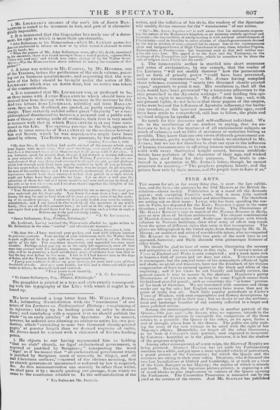We have received a long letter from Mr. WILLIAM JONES,
MA,, intimating dissatisfaction with the " conciseness " of our notice of his Lectures on Ecclesiastical History; complaining of Its injustice; taking up its leading points in order to discuss them; and concluding with a request that we should publish the whole "its an early number " of the Spectator. As we cannot, however, be seduced into allowing an author to notice his own pro- duction, albeit " extending to near two thousand closely-printed pages," at greater length than we deemed requisite ab initio, Mf. JONES must be content with a statement of his two leading points.
1. He objects to our having represented him as holding that no state* church, no legal ecclesiastical government, is required or justified by Scripture; interpreting the word legal" as if we meant that " all ecclesiastical government which Is justified by Scripture must of necessity be illegal, and all real Christians outlaws,"—instead of the obvious meaning, that no church government maintained or enforced by law is required, Ste. As this tnisconstruction can scarcely be other than wilful, We shall pass it by ; merely quoting one passage, from which we came to the conclusion alluded to. In the self-satisfaction of the ' The Italics are Mr. JONES'S. writer, and the inflation of his style, the readers of the Spectator will readily divine reasons for the " conciseness " of our notice.
"He"—.Mr. JONES &guitar —" is well aware that his sentiments respect.. ing the nature of the Redeemer's kingdom ae an economy entirely spiritual and heavenly—the impossibility of amalgamating it with national establishments of Christianity—and its hostility to every scheme of church-governments devised by the wit or wisdom of man—eannot fail to expose him to the contemptuous sneer and indignant frown of High Churchmen of every class, whether Papists, Episcopalian, or Presbyterian: but treatment such as that will neither sur- prise nor more him. His appeal is to the Law and the Testimony, to the writings of the Evangelists and Apostles; which he considers to be alone the rule of religion since Christ left the earth."
2. The immoveable author is startled into short sentences and notes of exclamation, by our remark, that the reader of
his Lectures "will not readily discover" how the persecutions
and so forth of priestly power " could have been prevented, under existing circumstance," — Mr. JONES having compiled
three volumes, containing " nearly two thousand closely-printed pages," expressly to point it out. His resolution is, that all the evils would have been prevented "by a tenacious adherence to the rule prescribed in the Apostolic writings : " and holding this opi- nion, he is right to maintain it. We differ from him ; and, with our present lights, do not believe that those pagans of the empire, (who were beyond the influence of Apostolic influence,) the barba- rian invaders, or the ignorant masses of the middle ages, could have been made to comprehend, still less to follow, the plain and spiritual religion lie speaks of.
So much for this intrusive and self-sufficient individual. We are in the recollection of our readers in saying, that we en-
deavour to bring to the treatment of all ecclesiastical subjects as
much of calmness and as little of acrimony or sectarian feeling as possible. They know that our own views of church government are in the abstract, pretty similar to those which we attributed to Mr. JONES; but we are not therefore to shut our eyes to the influence of human circumstances in affecting human institutions, or to run
a-tilt with every theological knight errant, because establish- ments have partaken of the character of their age, and wicked
men have used them for their purposes. The truth is em- braced in a quotation in Mr. Joanrs's letter, though he cannot penetrate its meaning—" The prophets prophesy falsely, and the priests bear rule by their means, and the people love to have it so."


























 Previous page
Previous page